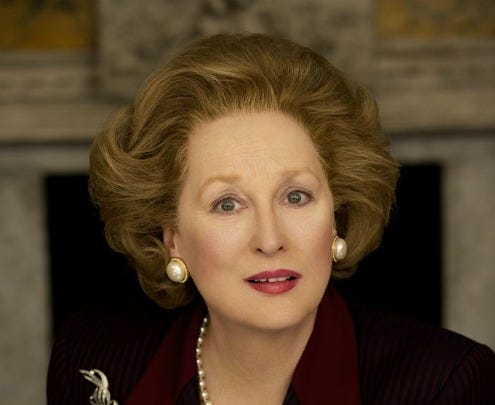The Iron Lady

"The Iron Lady" is a fairly standard biopic containing an extraordinary performance. That it is by Meryl Streep is not surprising; I'd say she has made a career resurgence in her 50s and early 60s except she never really experienced a lull. Streep arguably occupies the place where Morgan Freeman sat 15 years ago: America's greatest living film actor.
The Academy of Motion Picture Arts and Sciences might as well give her a nomination now. This would be her 17th Oscar nod, a number so astounding its impact is dwarfed only by the fact that her last win was in 1983, for "Sophie's Choice."
Based on her riveting, spot-on turn as British Prime Minister Margaret Thatcher, I'd say her dry spell for taking home golden statues may well come to an end.
I often feel that with movies of this sort, containing a performance that is so dominating and full-bodied, the film around it tends to suffer. Like Jamie Foxx in "Ray" or Philip Seymour Hoffman in "Capote," Streep's gravitational pull is so powerful, story arcs and secondary characters tend to get sucked into the vortex.
Only Jim Broadbent, giving his own golden-caliber turn as Thatcher's long-suffering husband Denis, is given time to add more than perfunctory notes.
Most films about politicians tend to shy away from the politics — especially when they don't sync up with Hollywood's leftist tilt. Director Phyllida Lloyd and screenwriter Abi Morgan make the bold and, I think, proper choice to put Thatcher's Conservative party ideals front and center to the story.
The movie isn't a diatribe for right-wing political conclusions but shows how Thatcher's self-reliant upbringing and tendency to demand the best of those around her colored her way of thinking. In an age awash in self-reflection and where the slacker mentality is idolized, this portrait of the vinegary Thatcher and her stern exhortations has a sort of bracing throwback freshness.
"It used to be about trying to do something," an elderly Thatcher complains to an admirer. "Now it's about trying to be someone."
The story unspools with old, doddering Thatcher reflecting on her life in flashback. Alexandra Roach plays young Thatcher, a grocer's daughter who ran for Parliament at age 24 (and lost). Over time, though, she gains standing until she believes it's time to run for leader of her party — not because she thinks she can win, but because she wants to bolster ideals she believes have grown flabby.
In the modern sections, Denis Thatcher has long been dead, but Margaret still talks to him (raising great concern on the part of her handlers). On a conscious level, she knows he's not there, but her soul so aches for his companionship that she refuses to dismiss his apparition.
Ever the chameleon, Streep is made up to resemble Thatcher rather closely, including that famous swoop of helmet hair. She gets the iconic voice just right, a squeaky goose's honk that she employed to scold and argue her point. Once scene, showing her receiving vocal training in preparation for her national campaign, has (deliberate?) similarities to 2010's "The King's Speech."
I thoroughly enjoyed "The Iron Lady," or more rather I enjoyed watching Streep embody Thatcher with a convincing mix of steel and velvet. This is a movie that contains greatness, though it never quite reaches it.
4 Yaps



